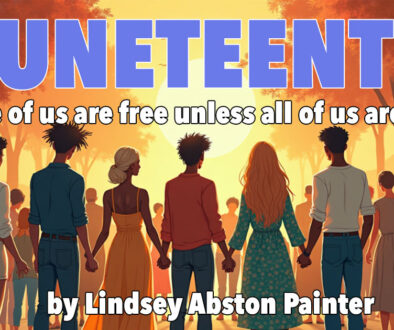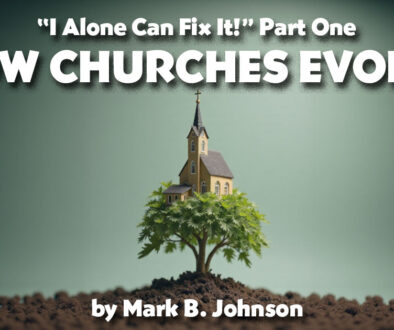October 22, 1844: A Solution in Search of a Problem
by Loren Seibold | 22 October 2024 |
A friend wrote me a note today. “Happy Great Disappointment Day,” he said. “Another year of remembering that something didn’t happen.”
Actually, the bearded ones told us something did happen. And who knows for sure?—though I confess I don’t find the tortured arithmetic terribly convincing.
But my problem is more basic than that. Why would it matter?
Ever since 1844, the Adventist explanation for what happened that day has been a solution in search of a problem.
What could it be?
Is it about my sins not being forgiven? No, that’s covered. “If we confess our sins, he is faithful and just and will forgive us our sins and purify us from all unrighteousness” (1 John 1:9). It doesn’t say he will forgive them only after 1844. People who lived before 1844 were forgiven, and we still are.
Atonement uncompleted? Again, according to Scripture, it was finished at the cross.
“All are justified freely by his grace through the redemption that came by Christ Jesus. God presented Christ as a sacrifice of atonement, through the shedding of his blood—to be received by faith. … the one who justifies those who have faith in Jesus” (Romans 3:23-26).
“Justified freely”! There is no future tense here. God justifies at the cross those who have faith in Jesus. Always has. Always will.
What about the notion that Jesus is up there trying to talk his father into saving us? I have a hard time believing that, especially in light of the Bible’s clear assertion that “…God our Savior… wants all people to be saved” (1 Timothy 2:3-4)
What remains? Perhaps some heavenly symbolism, some technicalities about the Day of Atonement? But even there, Hebrews insists that there was no further action to be taken after the cross. It was completed by Jesus being the final sacrifice, “once for all” (Hebrews 10:10).
As for Jesus moving into the Most Holy Place in 1844—well, sorry, but Hebrews 1:3 and 12:2, 1 Peter 3:22, and Acts 7:55-56 all say that Jesus took his place beside his father at his ascension, not 1.8 millennia later.
Anniversary
Whatever the theology behind it, the one thing we’ve kept insisting is that October 22, 1844, means that Jesus is coming “soon.”
So here we are, today, precisely 180 years since those sincere people gathered in their homes and barns, and even on a rock outcropping outside William Miller’s church, and looked to the heavens for Jesus’ appearance.
I don’t diminish them. Not at all. They were heroes of faith. Some sold everything and put it into the work. Farmers didn’t harvest their crops—they expected to be in heaven. Historian C. Mervyn Maxwell liked to tell the story of Charles Fitch, who baptized believers in a cold river and died of pneumonia a week before before the Great Disappointment. His wife told the children at the funeral, “Don’t cry. You’ll see daddy in just a few days.”
The Great Disappointment changed their lives. They needed a way to recover from their deep spiritual disappointment. I understand. I, too, have suffered disappointments. And what greater disappointment than thinking you’re about to leave this difficult old world, with its sickness and pain and war, and be forever with Jesus?
There is a psychological concept known as “disconfirmed expectancy.” It says that if a prophecy doesn’t come true, some will simply say, “Well, that was wrong,” and walk away—as many Millerites did.
But there will be another group that feels compelled to justify why they really weren’t wrong. Some detail was erroneous, perhaps. It was the right time but the wrong event. Or it happened somewhere else, someplace that we couldn’t see.
After processing the new explanation, those people actually become more dedicated to the prophecy than they were before!
The pioneers had to change the wording from “on this particular day” to “soon.” But they still believed. And ever since, we—their heirs—have been flopping about trying to make the word “soon” seem accurate.
Slow CPU?
I remember being told as a child that the angels are going through the books, and when they finally catch up, Jesus will return.
Can heaven have a data management problem? If Social Security can keep track of every dollar I have ever earned, and Medicare knows every pill I take, surely heaven can keep track of my activities, good or bad.
And if heaven knows my sins, they also know that Jesus has that area of my life covered. “Herein is love, not that we loved God, but that he loved us, and sent his Son to be the propitiation for our sins” (1 John 4:10).
So whatever happened up there—and I’ve heard more than one theory—hasn’t mattered very much to me. If it was a symbol of something, a metaphor of some kind, it isn’t one that has made a difference beyond what the Bible had already assured me, which is that all of my salvation needs cared for.
October 22, 1844, is still a solution in search of a problem.
That problematic “soon”
I have a vivid memory of Elder Lee Kretz preaching a potboiler sermon on Sabbath in our little church in Cleveland, North Dakota, about how Jesus was coming at any moment. He closed with, “Whether he comes in five minutes, or fifty years, will you be ready?”
I was about ten years old. It was so traumatic that I can remember the angle of the sun in the room, exactly where I was sitting, and the precise words he said. I also remember praying to myself, “Please, Lord, let him be right about the fifty years—not the five minutes!”
Sixty years have passed. Elder Kretz is dead. So are my parents and grandparents.
Here’s the thing you should know: to say “soon” is another way of setting a date. We made that mistake once, but we keep repeating it. We’ve been waiting a long, long time. For 180 years we’ve made people sit there and listen to our warnings—over and over and over again.
At what point is our “soon,” embroidered as it is with imminent calamities and tortures, merely meretricious?
Apparently, some Adventists have a great deal more patience with wrong predictions than I have. Jesus will return—but I have no idea when.
I no longer say “soon.” I say “someday.”
The necessary solution to nothing
I know that it is an Adventist requirement to believe that something happened that day. Hiram Edson, Uriah Smith, and Ellen White all said that it did. I can explain (thanks to the book of Hebrews, not Ellen White) the parallels between the sanctuary service and the plan of salvation. I can even see it as an instructive, if superfluous, metaphor.
But here’s what I can’t do. I can’t find any problem for which October 22, 1844, is the only possible solution.
I’m sorry. I just can’t.
 Loren Seibold is a retired pastor, and the Executive Editor of Adventist Today.
Loren Seibold is a retired pastor, and the Executive Editor of Adventist Today.




